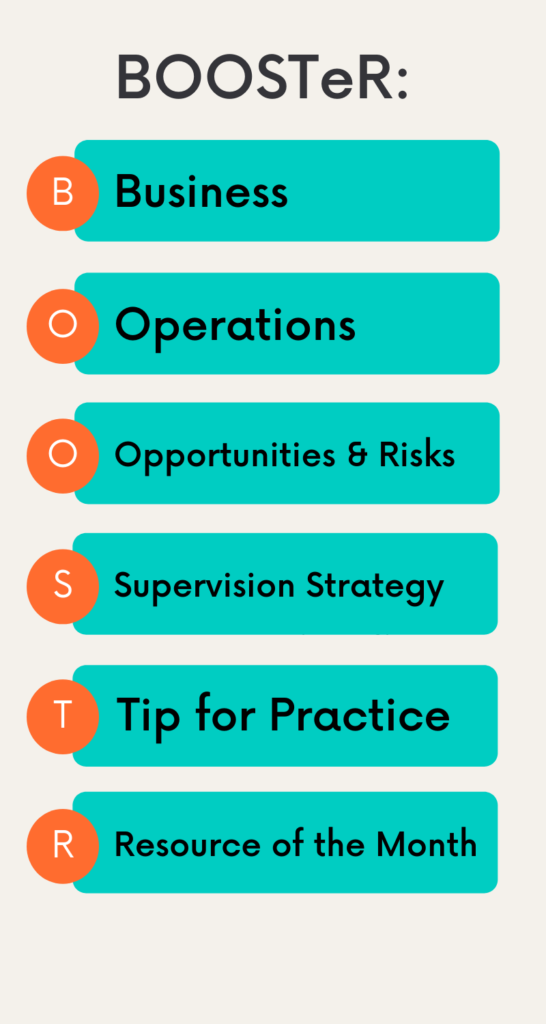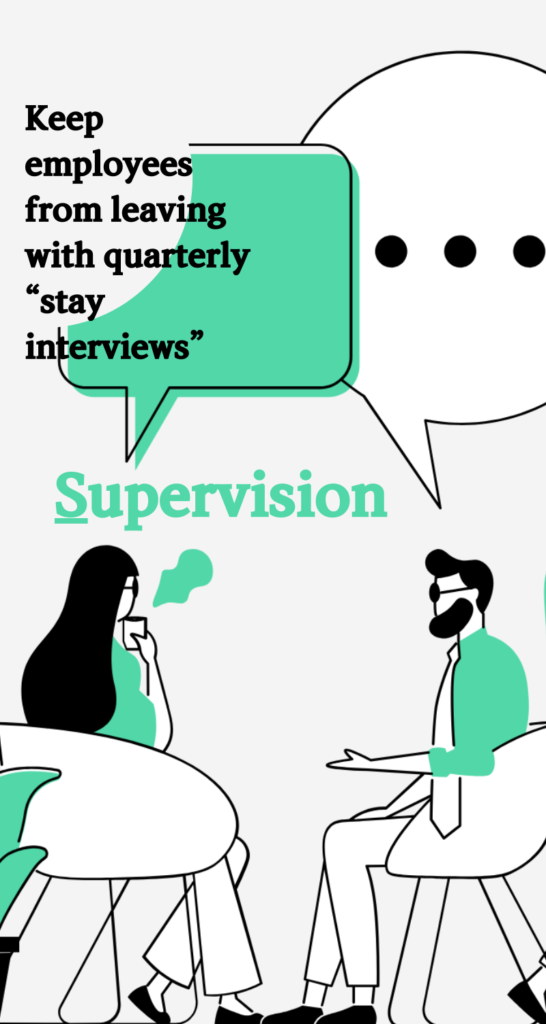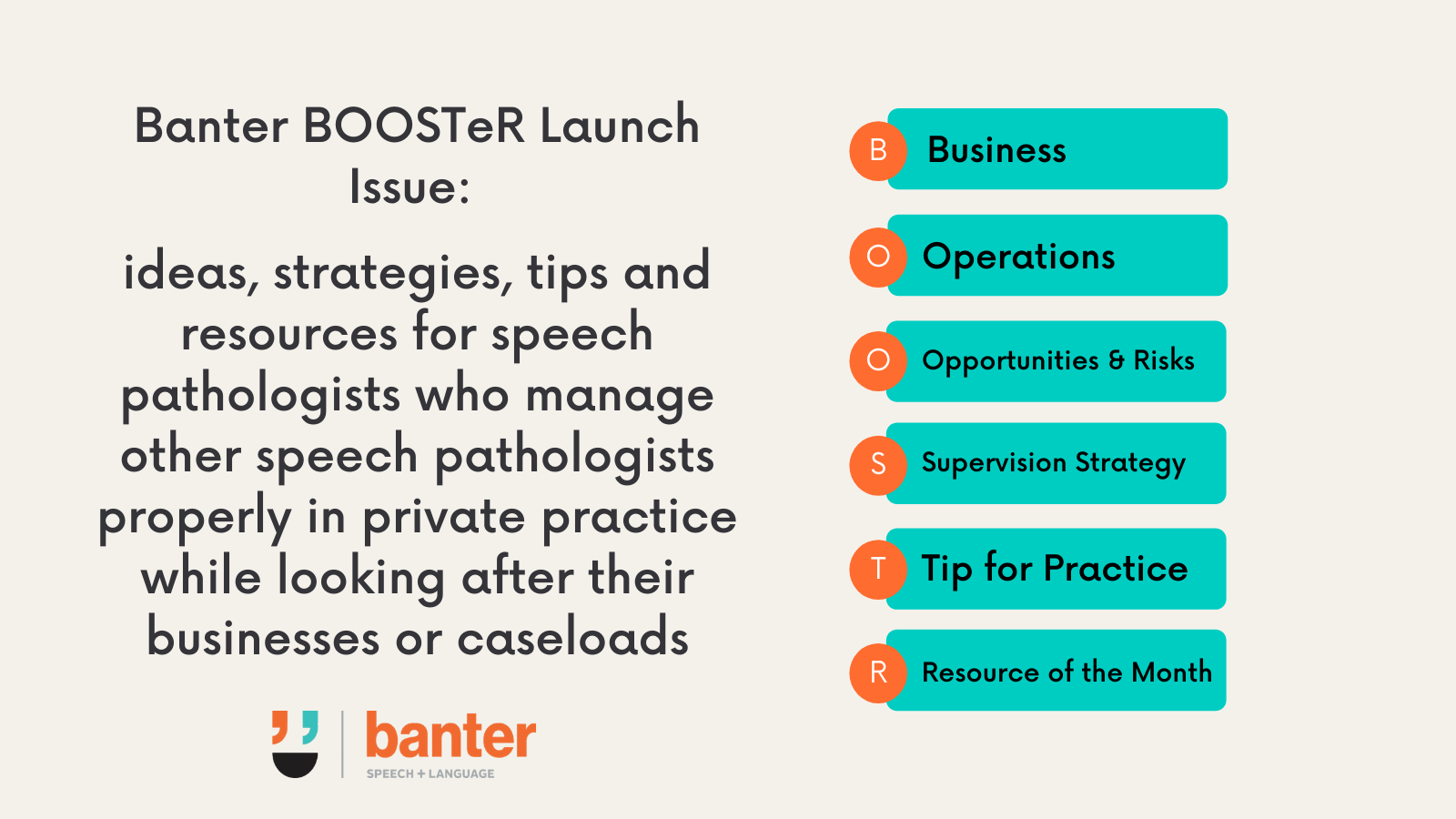Banter BOOSTeR Launch Issue: ideas, strategies, tips and resources for speech pathologists who manage other speech pathologists properly in private practice while looking after their businesses or caseloads
Managing speech pathologists in private practice properly is hard work. Do you need a BOOST?
- An increase or improvement in your practice?
- A source of help or encouragement?
- A gentle “push” from a colleague?
Do you want to:
- increase your skills in degree, amount, size or value?
- feel more vigor, life, energy, or spirit?
- make things better in your workplace?
- work in an organised and active way towards your goals?
Welcome to the first issue of Banter BOOSTeR. It’s a free, short, monthly newsletter by David Kinnane from Banter Speech & Language for time-poor speech pathologists who have the tough job of managing other speech pathologists properly in private practice while looking after their businesses or caseloads.
BOOSTeR stands for:

In this month’s BOOSTeR, we share ideas and tools to:
- demystify business jargon;
- explain key principles to grow your business;
- provide perspective on the risk of overwork;
- script out 5 questions you can use to reduce staff attrition;
- remove poor KPIs and reduce workplace toxicity; and
- highlight a resource to improve your management of child safety risks.
We’re focused on giving you quick, practical tips and resources from different disciplines that you can use to improve your skills and to manage speech pathologists properly in private practice.
Let’s go!
Business: Jargon-busting

We know from research on allied health reports that health jargon gets in the way of the message. It’s the same in business – especially if you don’t have a formal business education or background. Business talk and writing is full of buzzwords and, while we should use Plain English with clients, it helps to know common business acronyms and abbreviations so you can follow business trends in your practice.
When I was getting started in business, we had to invest in specialist business reference books. But, thanks to Michael Guta of Small Business Trends, you can easily track down simple definitions for high frequency office, management, marketing, finance and legal, and technology terms: Business Abbreviations and Acronyms You Need to Know.
Operations: Grow your practice and reach

When done right, growth creates value – for you, your team, and your clients. But investing in growth is scary – especially in uncertain times – and there are so many myths and superstitions about when and how to do it.
In our practice, we find that targeting several modest increments in many areas at the same time is a sensible strategy. So, too, is focusing on executing our ideas by communicating what we are trying to achieve to our team, tracking the inputs that matter most to our goals, and running mini-experiments as we go. All of these practices are consistent with what Michael Betz and colleagues at McKinsey called their Seven principles for achieving transformational growth. Although it’s targeted at the big end of town, these principles are tried and tested, and can be applied to businesses of any size.
Opportunities & Risks: Overwork can creep up on you

In private practice, our work is never done. If I wanted to be stupid, I could work 16 hour days, 7 days a week, and still have more to do. But my first career taught me that life’s too short to burn yourself out on an infinite quest to be a better professional. And it sounds like I learned that lesson the easy way.
Consider the near death experience of Jonny Frostick, a 45 year old manager in the UK: Overworked HSBC Manager Shares Near-Death Experience in Viral Post: ‘This Is Not How I Planned My Sunday’
What did he learn from nearly working himself to death?:
“1. I’m not spending all day on zoom anymore; 2. I’m restructuring my approach to work; 3. I’m really not going to be putting up with any [expletive] at work ever again — life literally is too short; 4. I’m losing 15 kg; 5. I want every day to count for something at work else I’m changing my role; 6. I want to spend more time with my family.”
Learn from Mr Frostick’s experience. No-one lies in their deathbed wishing they could have spent more time doing paperwork in the clinic!
Supervision: Keep employees from leaving with quarterly “stay interviews”

Supervision meetings should be honest two-way conversations where each side gets to listen, ask questions, and agree to follow up and execute specific tasks. If you’ve read my book, you’ll know that I set four structured blocks of around 10 weeks of weekly supervision every year with each staff member, with short gaps between.
In these gaps, I perform quarter performance snapshots, then encourage employees to reflect on the quarter, consolidate new skills, complete outstanding projects, and plan for the next quarter. It’s also a good time to take a mini-break from the high structure of training and project work to ask bigger questions – to see whether your employee’s interests and goals remain aligned with your practice, and whether employees are finding their work purposeful and satisfying.
Although the between-block process is less structured by design, it’s good to have at least some questions in mind to keep the conversation positive, constructive, and on track. Here are five useful questions you can adapt for your practice, based on the work of Marcel Schwantes at Inc. Magazine – Want to Keep Your Best Employees From Leaving? Ask Them These 5 Questions:
- What do you like about your job?
- Describe a good day at work that you had recently?
- What does your dream job look like?
- What do you like and not like about the PD opportunities available to you?
- Do you feel your skills and talents are being used to their fullest?
Tip for practice: Keep output-based KPIs out of your practice

We’ve known for over 50 years that an obsession with recording hours and using output KPI and targets as part of performance appraisals encourages low quality work, competition between individuals at the expense of teamwork, and cutting corners, which in turn leads to toxic workplaces.
If you have a toxic culture, you won’t be able to mask it for long. Your speech pathologists will tell their networks about it, clients will pick up on the discord, and the news will spread, first to other speech pathologists, and eventually to students and others. One thing I’ve learned from the legal profession is this: toxicity comes out eventually.
Don’t put employees in the difficult position of having to choose between staying for the sake of loyalty, or leaving for better opportunities. You’ll see things more clearly if you assume that no one owes you anything and accept that no one should have to work in a toxic workplace. Even though it’s hard, you need to step away from output quotas, re-establish team hospitality, and fix your culture.
Resource of the month: Improve your Child Safety risk management
If you’re working with children in your business, you need a child safety policy tailored for the realities of private practice. Our 17-page Child Safety Code of Conduct and Policy template is designed to help your practice to respond to, and implement, the National Principles for Child Safe Organisations published by the Australian Human Rights Commission, as an important step toward becoming a child safe organisation.
There you have it: your first BOOSTeR.
If you found BOOSTeR useful, please sign up below to receive it each month, or help us spread the word by sharing it with a colleague or on social media!

Hi there, I’m David Kinnane.
Principal Speech Pathologist, Banter Speech & Language
Our talented team of certified practising speech pathologists provide unhurried, personalised and evidence-based speech pathology care to children and adults in the Inner West of Sydney and beyond, both in our clinic and via telehealth.









